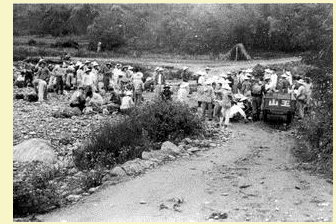| Founding In 1946, Reverend James Dickson acted as a special envoy of the Presbyterian Church in Canada to extend condolences to the Taiwanese Church for the catastrophes experienced during the Second World War. As a result of his particular interest in the mission work of the churches of the indigenous people in Hualien, Dickson commissioned Reverend Rong-Chun Wen to establish a school exclusively for missionaries for the indigenous community, which would become the “Taiwan Holy Book School” founded that same year in Hualien In 1949, the school’s name was changed to “Taiwan Bible Academy” with further changes in 1957 to “Taiwan Bible College” and again in 1959 “Yu-Shan Theological College”. After its founding, Yu-Shan Seminary experienced many years of instability and uncertainty with students seemingly wandering aimlessly on campus clutching clothing, pots, bowls, and a few books. One could only admire their dedication to doing the Lord’s work! In order to develop theological education for the indigenous people, the dean and faculty worked tirelessly and with great sacrifice. After relocating to Li-yu Lake, the endless toil continued with classes in the morning and work in the afternoon; all for the goal of transforming the wilderness into a thriving centre for theological education. From past to present, Yu-Shan has not only shouldered the responsibility of planting churches and training pastors and social workers, but also the arduous task of sustaining the vibrant culture and society of Taiwan’s indigenous people. Today, Yu-Shan is just as dedicated to the development and education of indigenous theology, cultural and social studies, as well as the socio-political issues that affect all of Taiwan’s indigenous people. Of the approximately 460,000 indigenous people Taiwan, about 300,000 are Christian; a testimony of the remarkable power of the Gospel in terms of social progress and stability within their community and a driving force behind Yu-Shan’s commitment to training future generations of missionaries of indigenous descent. So far, Yu-Shan’s graduates account for half of the total number of pastors and church workers currently employed in the churches of Taiwan’s indigenous people. In addition to theological studies, Yu-Shan also has departments in Christian Education, Church Music, and Social Work, resulting in a number of active professionals in these fields making significant contributions within the indigenous community. As with many minority societies around the world, the society of Taiwan’s indigenous people is experiencing a slow but clear erosion of its languages, culture, and its very identity. By actively engaged in preserving many important aspects of indigenous culture, Yu-Shan remains committed to maintaining the integrity of this important world treasure. In addition to a thriving Music Department, the school actively promotes cross-cultural musical exchanges, including the award-winning Lu-Bay Choir. In promoting indigenous languages, Yu-Shan holds indigenous language courses and Bible studies as part of its basic curriculum and encourages students to obtain official certification in indigenous languages; a first step in becoming licensed instructors. Students are also immersed in coursework relating to the special intricacies of indigenous social history, structure and development, not only to become better workers, but also to strengthen each student’s personal ethnic identity. Yu-Shan faculty, students, and alumni are concerned with many aspects of reform of indigenous society; a critical component in Yu-Shan’s overall mission philosophy. In addition to being actively involved in raising awareness and initiating reform in issues such as the environment, land rights and preservation, and sensitive political policies directly affecting the indigenous community, Yu-Shan is also committed to safeguarding human rights and the dignity of the indigenous population including anti-child prostitution, hospital and prison visitation, local school outreach, poverty relief, blood donation, and caring for the infirm and elderly.
Several times a year, Yu-Shan hold classes and seminars for both the seasoned Christian and the church newcomer in not only theology and Christian doctrine, but also in subjects such as social education, ethics, community development, ecology, law, and gender equality. Faculty and students often participate in government affairs, academic research cooperation, civil activities, and educational policy and materials particularly involving indigenous languages. Yu-Shan’s social education and service philosophy also embraces the well-being of the elderly, and emphasizes the importance of nurturing the younger generation of Taiwan’s indigenous community with programs specifically designed for teenagers to help them develop healthy lifestyles, positive personalities, and strong self-identities; enabling them to grow into influential members of society. |



